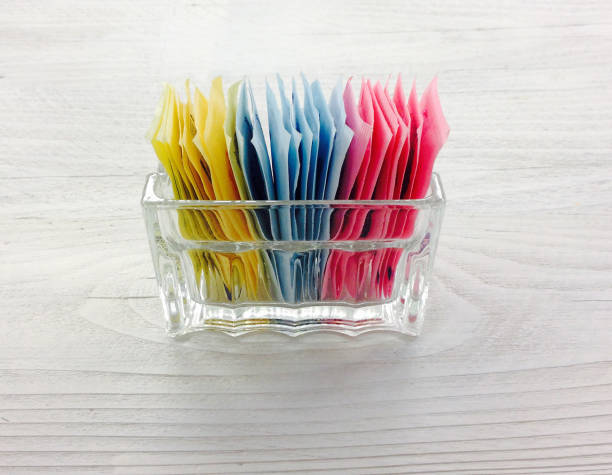
According to Statista, over 141 million Americans reported using artificial sweeteners in 2020. They further projected that this number would grow by more than three million by 2024. The main reasons people cited for turning to the sugar substitutes were weight management and maintaining a healthy lifestyle. Those reasons are also what make them so attractive to those who are living with diabetes. They’re touted as an excellent way to enjoy sweetness without the additional calories and spike in your blood sugar level. However, recent studies suggest that artificial sweeteners aren’t as healthy for you as previously stated.
RELATED: Are Artificial Sweeteners Making Weight Loss HARDER?
What Researchers Have Found
The first thing you should know is that the Food and Drug Administration (FDA) has generally deemed eight different artificial sweeteners safe for consumption. These are sucralose, aspartame, acesulfame K, saccharin, neotame, xylitol, advantame, and stevia. Artificial sweeteners can be used in beverages, baked goods, chewing gum, yogurt, and breakfast cereals, among other foods.
Of course, being safe for consumption is different from being recommended for weight loss or weight management. In fact, findings that people who substituted artificial sweeteners for sugar often didn’t achieve long-term weight loss led the World Health Organization (WHO) to issue a guideline about it. In this guideline, the WHO recommends that people don’t depend as heavily on artificial sweeteners for weight loss.
In one study, participants who were assessed over 20 years showed higher incidences of fat deposits than those who never used artificial sweeteners. This resulted in more weight gain and not accomplishing the better weight control that they wished to see. When some doctors were asked why this was, they suggested that the issue may be related to one of the key characteristics of these sugar substitutes – their lack of calories.
Though these sweeteners taste like sugar, they don’t offer any of the caloric input that your body needs. Doctors suggested that the lack of calories sparked a need to fill the gap. As a result, you’re more likely to reach for high-calorie foods for your next meal or as a late-night snack instead of healthier options. Without meaning to, you end up undoing any gains you might have had from reducing your earlier sugar intake.

However, those were only speculations until a recent study, which looked at how one specific artificial sweetener affects your brain. After examining sucralose, researchers concluded that when sucralose is consumed in a drink, it signals your brain to eat more instead of less or the same amount you usually would.
During this study, 75 participants were given repeated brain scans and had their blood drawn multiple times after drinking plain water, water with table sugar, and water with sucralose. They were also asked to give their subjective opinions about how hungry they felt. When assessed, the participants in the study showed a 20 percent increase in their appetite if they drank a beverage that contained sucralose instead of water with table sugar.
Additionally, the brain scans showed that sucralose may do more than increase your hunger. After drinking water with the sweetener, the participants’ scans showed increased brain connectivity between their hypothalamus and anterior cingulate cortex. This action controls the risks and rewards of the decisions they make, suggesting that drinking sucralose can affect your decision-making skills when you’re ready to eat.
Blood tests also showed that sucralose didn’t affect the hormones that usually signal your brain to tell your body that you’re full. This means that even though you’ve had something to drink, your body still thinks it’s in deficit and will prod you to keep eating. If you opt for high-calorie foods, you won’t lose weight.
RELATED: The Truth About Artificial Sweeteners

What to do Instead
If you’re focused on losing weight and reducing your sugar intake, there are more effective ways to do that. Generally, it involves monitoring how much sugar you add to your meals as well as the hidden sugar in what you eat. The first step in tackling hidden sugar is learning how to read the nutritional panels on what you buy. These panels will not only list how much sugar is in your food, but they’ll also separate added sugar from what’s naturally occurring and state what percentage of your daily recommended limit it represents.
When it comes to the amount of sugar you use, the experts recommend slowly training your tastebuds to accept less sugar. That means eliminating additional table sugar when eating and cutting the recommended sugar in recipes in half. It may take some time to adjust to the lower sugar levels, but eventually, it won’t be as noticeable. The need to taste sugar is why so many people opt for artificial sweeteners in the first place. Unfortunately, it’s clear that cutting sugar is a much better option.
Instead of drinking low-sugar beverages all the time, drink water as much as possible. Even water that’s flavored with fruits is a better option than those that contain artificial sweeteners. If you’re craving a sweet treat, consider lightly sweetened beverages that will scratch that itch.
Natural sugars can also help when you need something sweet. Instead of sweetening your cereal or oatmeal with sugar, try fruits. While fresh is best, frozen fruits can also work in a pinch. Canned fruits or another option, but it’s a good idea to get rid of the syrup they come in before adding those fruits to your cereal. Ideally, you should use fruits that are canned in water or juice. Dried fruits can also contain added sugar, so it’s a good idea to choose the ones that are labelled as unsweetened.
Herbs and spices can also take the place of sugar in certain meals. Ginger, allspice, cinnamon, and nutmeg can be excellent substitutes. If a savory recipe calls for sugar, unsweetened apple sauce is a healthier alternative. Flavor extracts can help you reduce additional sugar in a recipe, too. They offer a boost of flavor without contributing any sugar to your meals.
Doctors have been recommending artificial sweeteners as a great substitute for sugar for years. They are regularly touted as being a safe alternative for people who need to manage their weight and blood sugar levels. However, a recent study has confirmed that drinking certain sweeteners can increase your risk of weight gain. While more research needs to be done, it’s a clear sign that you should explore different ways of reducing your sugar intake.









